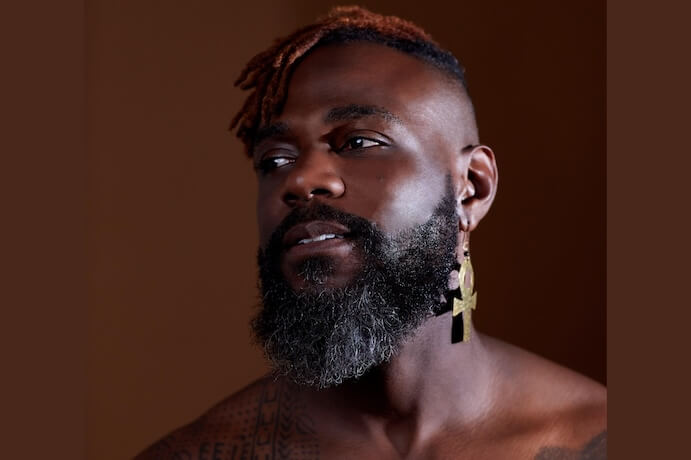Omar Thomas is an award-winning composer and jazz artist based in Austin, TX. Raised in a Guyanese family in Brooklyn, he has written extensively for big band and wind ensemble as well as symphony orchestra. His work often explores queerness and Black liberation, including in his piece A Mother of a Revolution, a celebratory tribute to Marsha P. Johnson and other pioneering trans women.
Thomas began teaching early in his career, and he is currently an Associate Professor of Composition at The University of Texas at Austin. He studied at the New England Conservatory and maintains strong ties to the region, recording his most recent album, Griot Songs, in Boston with his 17-piece Omar Thomas Large Ensemble.
The album, out Feb. 7 on physical and digital media, is a testament to Thomas’ passion and resilience. The project began almost two decades ago (the earliest compositions date back to 2008), and the stylistic range reflects his breadth of experience as a composer, band leader and social activist. The album is a significant contribution to contemporary big band music with its rich narratives, polystylism, and emotional depth.
Each piece on the new 83-minute opus is meticulously crafted and the album seamlessly blends original compositions with fresh arrangements (including a lyrical interpretation of Lyle May’s “Episode d’Azur”). Thomas invokes figures from African and Afrodiasporic cultures; the griot — a musical storyteller and keeper of history, whose role’s origins extend back to the Mali Empire — and the obeah woman, a female practitioner of the syncretic Afro-Caribbean religion, Obeah (famously sung about by Nina Simone in the song “Obeah Woman” by Bahamian musician Exuma).
We caught up with Thomas just before the release of Griot Songs to ask him about his artistic and activist practices.
What is the writing process like for you, and how does it differ between original compositions and arrangements?
The writing process for me tends to be a roller coaster of emotions. It’s exciting, it’s painful, it’s joyful, it’s humbling, it’s empowering, it’s frightening..and sometimes I can feel all those emotions in one writing session! It can take some time to create an idea with enough of an emotional identity that I can explore and exploit into a full work, but once I feel like a soundworld is being created, all decisions I make from that point forward are in service to that soundworld.
The easy answer to the second part of the question is that with originals, I’m simultaneously creating and manipulating materials whereas with arrangements, by and large, all the materials are already there for me to manipulate – but this depends on how true to the original work I’m staying vs. how much I’m attempting to make something that’s more my own. With my “Sail to the Moon” arrangement from my forthcoming Omar Thomas Large Ensemble release Griot Songs, I stayed true to the original Radiohead song while adding over twice as much material to more fully explore the soundworld of the original song, while my arrangement of Lyle Mays’s “Episode d’Azur” is almost verbatim the original work executed with different instrumentation.
How does your work as an educator resonate with your work as a social activist and musician?
All of those areas are one and the same in my eyes. Every piece is an opportunity to educate and to make space for a story that hasn’t yet been told, or that hasn’t been told in quite this way or that way. Music is the ideal vehicle for this transmission, as music tends to phase through any walls that we’ve erected or that have been erected around us, getting straight to the soul of and connecting with the energy of the listener.

Omar Thomas — Photo by Mike Lebriasis
You’ve spoken about the dearth of representation for Black composers in the band and classical music worlds – what are the factors creating progress versus those producing resistance that you see in 2025?
The factors creating progress have been catalyzed by a willingness in the field to acknowledge whose stories are missing from the concert stage, in a moment where the world is becoming smaller due to our digital hyperconnectivity. Several individuals and organizations who have the most access to the power to change the narrative have been listening and making space in rehearsals and on programs for composers such as myself to share who we are. The resistance to shifting representation in concert music is rooted in what it’s always been rooted in – comfort, familiarity, ownership, and set hierarchical ideas about whose stories are worth telling.
How do you relate artistically and imaginatively to figures like the griot?
The griot, in West African and diasporic traditions, is a storyteller. They are responsible for the proliferation of history and culture via oral tradition. The magic of a griot lies in their captivating delivery. As such, it was quite easy for me to stand tall and firm in this role. I was first called a griot over a decade ago by a dear friend and fellow musician. It’s a label that I’ve taken to heart ever since, and a responsibility that I carry proudly.
Griot Songs marks the completion of 17 years of work – does the album’s release feel like a point of closure or the beginning of a new exploration?
The release of Griot Songs feels like a return to myself – simultaneously the completion of a dream and a stepping-off point down a road that merges all of the music that I’ve internalized over the past 17 years. I hope for it to serve as a return to the jazz medium, and I hope that the community is willing to welcome me home. I intend to continue to use what I’ve learned and what I’ve lived in jazz to inform the music I create for whichever ensemble I am writing, be it a wind ensemble, a big band, or otherwise.
I CARE IF YOU LISTEN is an editorially-independent program of the American Composers Forum, and is made possible thanks to generous donor and institutional support. Opinions expressed are solely those of the author and may not represent the views of ICIYL or ACF.
You can support the work of ICIYL with a tax-deductible gift to ACF. For more on ACF, visit composersforum.org.






